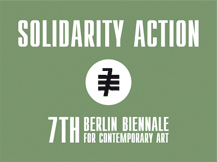1 I don’t believe that art, serious, true art, necessarily has to have an active role connected with its timeliness, or in an explicitly political sense. What it does do, in my view, is instead to activate (and reactivate) a prophetic potential of transformation inside languages and human experience, which is never timely and always “political” in the wider sense of the term.
2/3/4 All the art institutions today are going through the contradiction between their public mission and the market ideology, that dictates their transformation into entertainment while revamping them into showcases for the corporate monoculture. Art as merchandise, entertainment, a trophy of power. The alternatives cannot help but pass through an overall redefinition of the public role in access to culture, considered in all its moments, from education to research to production, and therefore developing original forms of rooting in the social and economic fabric.
6 As has been written, today the neocapitalist model meets with one of its purest applications in the “art world”. Competitive advantage, professionalization, marketing, star system, flattening onto the logic of advertising and maximum profit, etc: all ingredients of a blend that has deeply altered the social profile of artistic experience, and for whose critique not even the claims of non-profit status can be sufficient, any longer, given the fact that this sector actively takes part, though in an indirect way, in the formation of value. The choice cannot help but be critical, case by case. Nothing can be taken for granted.
5/7 The task, more urgent than ever, of civil reconstruction of Italy cannot but start with a new awareness of the role of art experiences in the design of a more open, plural, dialectic present than the one eternally caught in the cycle of consumption without memory and obsolescence of goods. I believe this is the biggest responsibility of artists, critics and institutions today.
8 In Italy the institutions have suffered for many decades from dependency on “politics” seen as the strenuous pursuit of consensus. The time has come to separate public institutions from the logic of political patronage, giving them statutes, means and independence that allow them to become true motors, public places in which to make innovative proposals and debate converge. The creation of opportunities for public discussion and interaction on cultural policy is one of the tools with which this new vision can be nurtured.
9/10 With the whole weight of its history and its suffocating bureaucratic tradition, Rome now has two large “places” set aside for contemporary culture. I believe this fact will contribute to renew an art scene that has been very marginal over the last twenty or thirty years, restoring to the city that international openness it so urgently needs. A change of mentality that can prompt investigation beyond the usual logic, combined with capacities of programming and a desire to experiment with new forms of cooperation between the territory and institutions, are the moves with which the city can again take an active role on the international stage.
STEFANO CHIODI
Curator of Macro since 2011. Editor of www.doppiozero.com. Professor of History of contemporary art at the University of Roma Tre.


